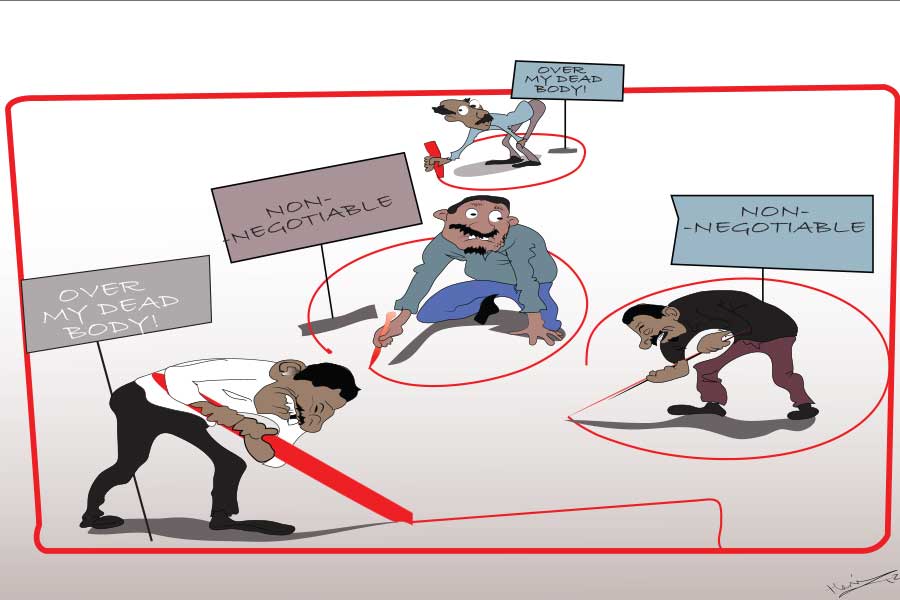
Fortune News | Jan 19,2024
Oct 2 , 2021
By Stephen Brien (PhD)
Ethiopia has the potential to become a prosperous country. In recent times, it has been one of the world’s best performers in economic growth. The country needs to capitalise on these past successes and embrace private enterprise and a stable political settlement going forward, writes Stephen Brien (PhD), director of policy at the Legatum Institute, a London-based think-tank.
Ethiopia is an important country in Africa and is at a pivotal moment in its history. The second-most populous nation on the continent has a long, rich, and proud history, and is situated in the politically strategic Horn of Africa. Its future is not only vital for Ethiopian citizens but will have an impact on the development of the whole continent.
Prime Minister Abiy Ahmed (PhD) has already accepted that there must be changes in the way Ethiopian governments have operated, and he has expressed commitment to respecting traditional democratic accountability, in marked contrast with his predecessors. He knows that there remain substantial risks for prosperity if the state chooses to pursue an authoritarian political model.
The Legatum Institute (where the author is a director of policy) is publishing a new report that shows the huge opportunities for Ethiopia are around the corner for its people if the country starts embracing a more open, inclusive economy underpinned by a stable political settlement.
To achieve prosperity and economic development, a country needs political stability and a trustworthy state. Historically, Ethiopia has been governed in a strongly authoritarian way with a state-led and controlled economy. The resulting dominance of one group or party over all institutions and aspects of life, the control of opposition parties, civil society organisations and the media, and interference with the judiciary, have all held back prosperity.
The report suggests that the road to prosperity requires power to be shared between different stakeholders for the public good, with meaningful checks and balances on how it can be exercised in the political, institutional, and economic spheres, as well as respecting human rights. Ethiopia’s regions and the centre also need to work together for common interests and objectives.
Second, states can become prosperous only if they are delivering through enlightened institutions and civil servants. In the past, higher-ranking civil servants have generally been appointed due to party loyalty or ethnic factors, creating scope for corruption and hindering the state’s ability to deliver efficiently for its people.
A skilled, merit-based civil service that puts Ethiopian citizens at the centre of its activities and brings the country together is needed to support reforms to open the economy, to attract foreign investment and skills, to support the productivity of small farmers and the ‘informal’ sector, and to provide high-quality social services.
International donors, including the US, UK, EU, and the World Bank provided financial support to the previous government without sufficient regard for the capacity of the civil service, and this is something international donors need to be mindful of in the future. There has been a mismatch between the ambitions of the ‘developmental state’ model and the civil service that the ruling party was able to provide.
The third driver of prosperity is good infrastructure. Ethiopia has had one of the highest rates of public investment in the world. Despite this, ‘last mile’ connections and maintenance have been relatively weak, and the country has one of the lowest levels of mobile and internet access in the regions. This is largely because of the reliance on a monopolistic state-owned provider and the lack of an independent regulator.
The use of mobiles in neighbouring countries has resulted in substantial gains for rural inhabitants, and the new Ethiopian government has started to implement reforms that could lead to the opening of this sector. But it is vital that the government prioritises consumer rather than producer interests and does not merely protect the interests of state-owned enterprises, so that urban and rural populations are served.
Fourth, Ethiopia’s investment environment has not kept pace with international developments over the past decade. By requiring state-controlled banks to prioritise financing public sector infrastructure investments and state-owned enterprises, credit to the private sector is among the lowest in East Africa. Ethiopia has become one of the most underbanked countries in the world, particularly affecting the rural population.
Effective and broad-based allocation of capital is critical to unlocking the country’s economic opportunities, and prosperity will be supported by a robust and competitive financial sector. Banks should be able to shift their focus to support private sector, small and medium-sized businesses, and the under-banked rural population.
Ethiopia has been very successful in attracting global brands, partly through investment in industrial parks. It is important that this success is maintained and that the industrial parks are linked to local small and medium enterprises.
Finally, the new government has rightly placed strong importance on improving Ethiopia’s business climate, to increase the productivity and competitiveness of Ethiopia’s private sector. But there has been limited progress thus far on simplifying business start-up costs and procedures.
The government has committed to a privatisation process, and it is clear that ending the preferential treatment of state-owned enterprises and politically-linked companies is a vital step on the pathway to prosperity. But privatisation itself will not contribute to prosperity. It is vital that Ethiopia also shifts its broader regulatory order to embrace private enterprise and capital and strengthen the judiciary and rule of law systems in the country to avoid the risk of corruption in these processes, as experienced in other countries.
Ethiopia has the potential to become a prosperous country. In recent times it has been seen as one of the world’s best performers in economic growth. Now is the moment to capitalise on these past successes, and to embrace a more inclusive economy and a stable political settlement, so that sustainable economic growth and solid upper middle-income status are assured.
PUBLISHED ON
Oct 02,2021 [ VOL
22 , NO
1118]


Fineline | Nov 30,2019

Viewpoints | Feb 13,2021

Radar | Apr 17,2021

Radar | Aug 16,2020

Editorial | Jan 04,2020

Photo Gallery | 179335 Views | May 06,2019

Photo Gallery | 169532 Views | Apr 26,2019

Photo Gallery | 160442 Views | Oct 06,2021

My Opinion | 137171 Views | Aug 14,2021
Commentaries | Oct 25,2025

Dec 22 , 2024 . By TIZITA SHEWAFERAW
Charged with transforming colossal state-owned enterprises into modern and competitiv...

Aug 18 , 2024 . By AKSAH ITALO
Although predictable Yonas Zerihun's job in the ride-hailing service is not immune to...

Jul 28 , 2024 . By TIZITA SHEWAFERAW
Unhabitual, perhaps too many, Samuel Gebreyohannes, 38, used to occasionally enjoy a couple of beers at breakfast. However, he recently swit...

Jul 13 , 2024 . By AKSAH ITALO
Investors who rely on tractors, trucks, and field vehicles for commuting, transporting commodities, and f...

Oct 25 , 2025
The regulatory machinery is on overdrive. In only two years, no fewer than 35 new pro...

Oct 18 , 2025
The political establishment, notably the ruling party and its top brass, has become p...

Oct 11 , 2025
Ladislas Farago, a roving Associated Press (AP) correspondent, arrived in Ethiopia in...

Oct 4 , 2025
Eyob Tekalegn (PhD) had been in the Governor's chair for only weeks when, on Septembe...

Oct 25 , 2025 . By YITBAREK GETACHEW
Officials of the Addis Abeba's Education Bureau have embarked on an ambitious experim...

Oct 26 , 2025 . By YITBAREK GETACHEW
The federal government is making a landmark shift in its investment incentive regime...

Oct 29 , 2025 . By NAHOM AYELE
The National Bank of Ethiopia (NBE) is preparing to issue a directive that will funda...

Oct 26 , 2025 . By SURAFEL MULUGETA
A community of booksellers shadowing the Ethiopian National Theatre has been jolted b...